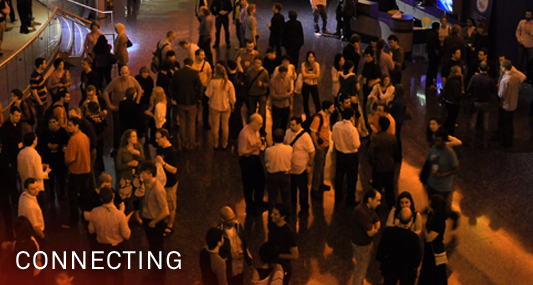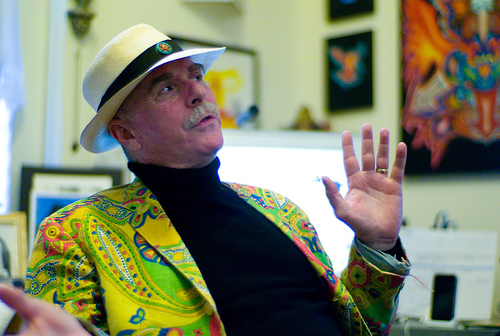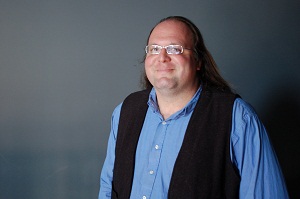
Plenary Speakers
This year's opening plenary speaker will be Howard Rheingold.See the opening plenary in the advanced program.
This year's closing plenary speaker will be Ethan Zuckerman.
See the closing plenary in the advanced program.
Opening Plenary Speaker
This year's opening plenary speaker will be Howard Rheingold.
My explorations of social media and social media literacies in teaching & learning
Although not an educator by trade, I've been interested in the potential of online media for learning since I started exploring what I called "virtual communities" in the 1980s. In particular, I was attracted to the ways online media could facilitate collaborative knowledge sharing and exploration. In 1995, I designed a demonstration of a "university of the future" for NEC corporation. In 2006, I started teaching at UC Berkeley and Stanford. I was initially drawn to formal education because I perceived a need to introduce students to the issues of identity, privacy, collective action, public sphere, social capital raised by our increasing use of what are now called social media. It only made sense to use blogs, wikis, forums, chat, and social bookmarking when introducing these subjects. Contrary to popular beliefs about "digital natives," I soon learned that social media literacies are not uniformly understood by today's students. At the same time, by paying attention to what students were telling me about our encounters, I was led to forms of pedagogy that have existed at least since the time of John Dewey but which have not been practical until the advent of social media -- teaching and learning that is more collaborative and inquiry based and which extends beyond the face to face classroom. I'll talk about how I've learned from my students, how we've learned to learn together, and how I am now experimenting with purely online teaching and learning. I'll touch upon the social media literacies that are the subject of my current book in progress: attention, participation, collaboration, crap detection, and network awareness.
Bio
An acknowledged authority on the marriage of mobile phone, PC, and wireless internet, Rheingold's previous work reveals how this convergence has changed the way we meet, mate, entertain, govern, and conduct business. His book Smart Mobs, named one of the "Big Ideas books of 2002" by The New York Times, chronicles the new forms of collective action and cooperation made possible by mobile communications, pervasive computing, and the Internet.
Rheingold is the recipient of a 2008 MacArthur Knowledge- Networking Grant through the Foundation's Digital Media and Learning Competition. He was founding Executive Editor of Hotwired, the first commercial webzine where the web-based discussion forum and the online banner ad were invented. Rheingold has appeared on Today, Good Morning America, ABC Primetime Live, CNN, CBS News, NBC News, Macneill-Lehrer Report, NPR’s Fresh Air and Marketplace. He currently teaches at Stanford University.
Closing Plenary Speaker
This year's closing plenary speaker will be Ethan Zuckerman.
Desperately Seeking Serendipity
The spread of social media has put powerful publishing tools in the hands of people around the world. The democratization of publishing makes it possible to encounter news and perspectives from far beyond our national borders. But social media also encourages us to pay attention to what friends find interesting and compelling, which often reinforces our existing prejudices and preconceptions. Whether social media broadens our world or narrows it is a function both of how we navigate this new landscape and what the tools we build make it easy or hard to do.
Technologists have spent a great deal of time trying to control a flood of user-produced information with filters. But more dangerous than "filter failure" may be filters that work too well and insulate us in informational echo chambers. We need better tools for serendipity, to help us encounter the unexpected, provocative and helpful from outside our information orbits. The inspiration for engineering serendipity may not come from the organization of information, but from the organization of physical space, and from one of our earliest communication technologies: the city.
Bio
Ethan Zuckerman is a senior researcher at the Berkman Center for Internet and Society at Harvard University and a fellow at MIT's Center for Future Civic Media. His research focuses on the distribution of attention in mainstream and new media, the use of technology for international development, and the use of new media technologies by activists.
With Rebecca MacKinnon, Ethan co-founded international blogging community Global Voices. Global Voices showcases news and opinions from citizen media in over 150 nations and thirty languages, publishing editions in twenty languages. Through Global Voices, Ethan is active in efforts to promote freedom of expression and fight censorship in online spaces.
In 2000, Ethan founded Geekcorps, a technology volunteer corps that sends IT specialists to work on projects in developing nations, with a focus on West Africa. Previously Ethan helped found Tripod.com, one of the web's first "personal publishing" sites. He blogs at http://ethanzuckerman.com/blog and lives in the Berkshire Mountains of western Massachusetts, USA with his wife, son and a small, fluffy cat.
